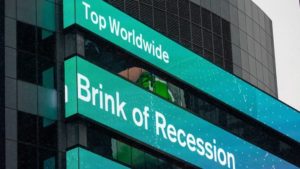

Strange Sounds – May 20, 2022
The global economy is “teetering on the brink of recession” as the war in Ukraine, Covid-19 lock downs in China and a hawkish US Federal Reserve weigh on activity worldwide, the Institute of International Finance said in a report.
In its latest forecast, the IIF estimates global gross domestic product to grow 2.2 per cent this year, with activities slowing to 0.5 per cent in the fourth quarter. The Euro area as well as emerging markets, excluding China, are anticipated to go into a recession by the end of the year.
“Since the statistical carryover from 2021 is 2.3 per cent, this is a de facto flatlining of global GDP,” the report said.
The IIF’s estimates are below the latest prediction from the International Monetary Fund, which has also lowered its growth forecast this year, due to the Ukraine war and inflation stoked by soaring commodity prices.
The IMF projects global growth at 3.6 per cent this year and next, down 0.8 and 0.2 percentage points from its January forecast, respectively.
With the possibility of a recession, market regulators must approach policy normalisation more cautiously, the IIF said.
“In the past, rising uncertainty and mounting recession risk have had important effects on investor psychology, making markets less tolerant of monetary policy tightening that is seen as no longer warranted,” the institute said.
It cited the Fed’s last rate hiking cycle in December 2018, which it was forced to end abruptly after the S&P 500 index fell sharply. Markets judged that hike to be “unwarranted”, given the escalating trade war between the US and China at the time, the report said.

